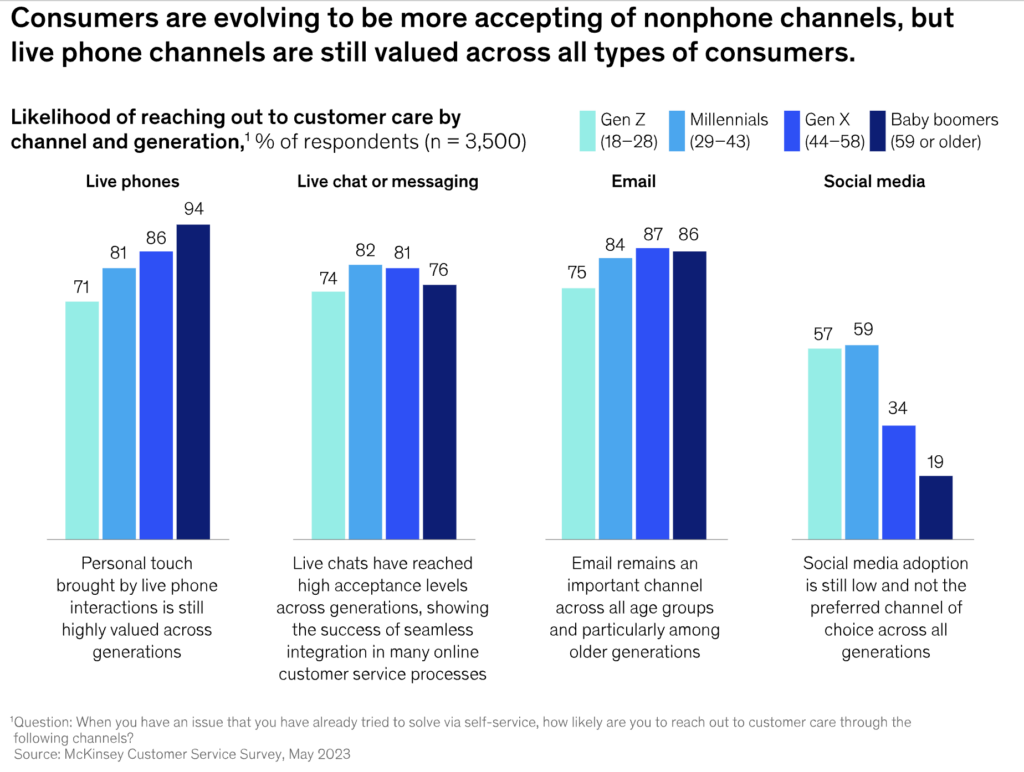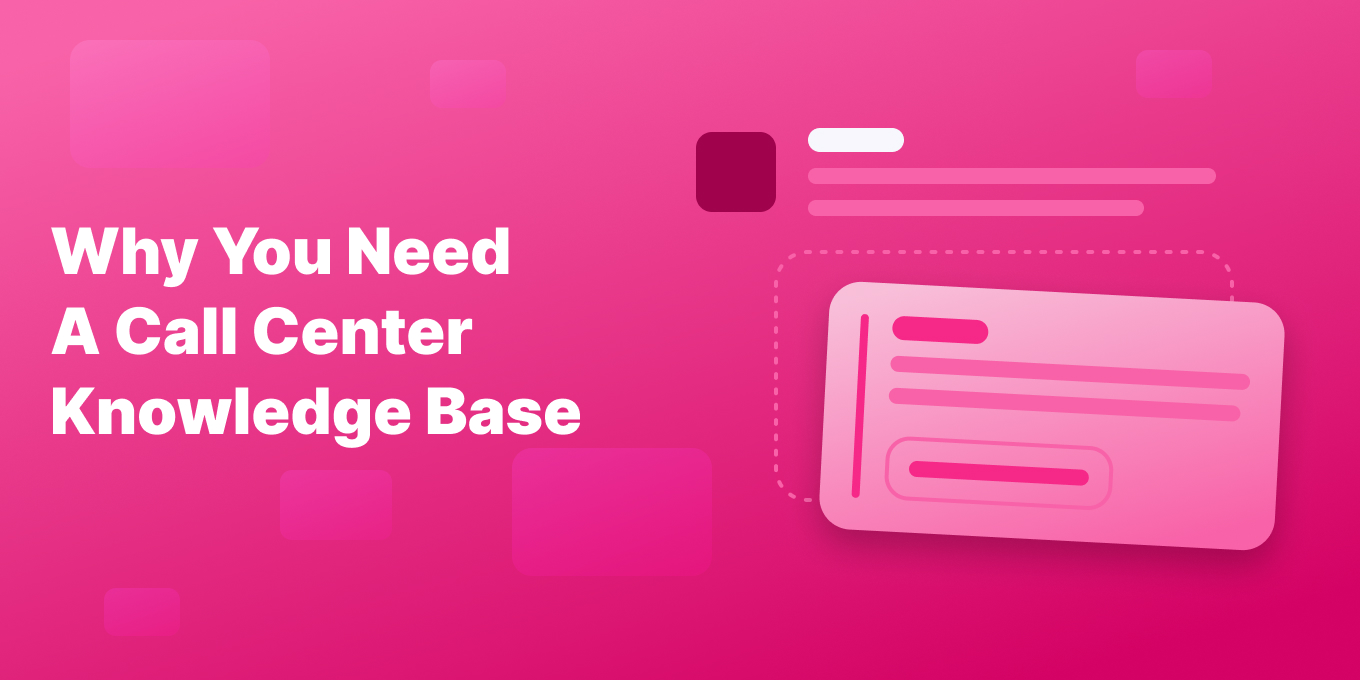Call centers are constantly searching for methods to enhance the quality of their service and streamline operations.
With multiple touchpoints and channels for customers to reach contact centers, there needs to be an underlying platform and system for information to be processed.
“Organizations struggle to combine all of these different channels and integrate them into a consistent customer experience. And that’s one of the core key success factors that we see—if you can offer different channels that you integrate into the overall experience. What does it mean? It means, for example, that you have to build some kind of platform that is below all of these channels, that is integrating different requests, and that also allows an organization to follow a customer through the different interactions so that it becomes a consistent customer journey—not a set of different interactions that are somehow linked,” said Julian Raabe, a partner at McKinsey who has worked with numerous call and contact centers.
That’s where knowledge bases (both internal and external) come into play.
In this article, we’ll go deeper into the importance and benefits of knowledge bases for call centers and support teams, and you may pick up a few insights into how a knowledge base could transform your customer support operations.
What is a Call Center Knowledge Base?
A call center knowledge base is an internal centralized repository (also known as an internal knowledge base) designed to store a wealth of information related to customer support, including documentation, standard operating procedures, troubleshooting guides, FAQs, and more.
Its primary purpose is to facilitate quick and easy access to critical information, enabling customer support agents to provide accurate and consistent responses to customer inquiries.
This tool is paramount in streamlining customer support operations, ensuring that all agents are equipped with the knowledge needed to resolve issues efficiently and maintain a high level of customer satisfaction.
- More: 34 call center and customer service scripts you can use today
Why is a knowledge base important for call centers?
The significance of a knowledge base in a call center cannot be overstated. It ensures consistency in customer service across various channels, thereby enhancing the customer experience.
By centralizing up-to-date information, it empowers trained staff to access relevant data swiftly, thereby improving the efficiency of call center operations.
A well-maintained knowledge base is instrumental in reducing the time agents spend searching for information, enabling them to focus more on addressing customer needs.
What are the benefits of a call center knowledge base?
1. Improved customer experience
The goal is to have customer inquiries solved as fast as possible.
“The biggest driver of great customer experience that we saw is the ability to solve customer issues in the first contact—what we call first-call, or first-contact, resolution,” said Raabe in that McKinsey conversation.
A knowledge base significantly contributes to an improved customer experience by ensuring quick and accurate responses, fostering consistent customer touchpoints, and ultimately building brand loyalty.
This tool allows agents to access a vast array of information swiftly, ensuring that customer inquiries are resolved promptly and accurately, leading to a more satisfying customer service experience.
2. Quick access to information for agents
Agents benefit immensely from quick access to information, courtesy of the knowledge base’s features that allow for easy navigation and access to contextually relevant pages.
- Bonus: Add Kai, the Tettra AI knowledge bot, to your knowledge base and get answers even faster
This functionality ensures that agents can quickly find the information they need, reducing the time spent on each call and enhancing the overall efficiency of the customer support process.
3. Reduced response times
The knowledge base plays a crucial role in reducing response times in call centers. By eliminating the need for agents to search extensively for information, it allows for more efficient handling of calls.
This efficiency not only improves the customer experience but also enhances the productivity of the call center by allowing agents to handle a larger volume of calls.
McKinsey research shows that customers in general prefer the phone to ensure that their issues are handled and resolved. It’s actually been growing, despite more ways of communication.

4. Decreased attrition rates
A robust knowledge base contributes to decreased attrition rates by empowering agents with the information they need to handle inquiries confidently and efficiently.
This empowerment, coupled with a supportive work environment and opportunities for career development, can significantly reduce stress and frustration among agents, leading to lower turnover rates.
A knowledge base can also provide that solid backbone for knowledge transfer when an agent does leave or gets promoted.
How do you maximize the effectiveness of your internal knowledge base?
Training is paramount for agents to effectively utilize the knowledge base.
They need to be proficient in navigating the system, understanding its structure, and leveraging its capabilities to enhance their productivity and the quality of customer support provided.
Agents require comprehensive training on how to effectively use the knowledge base system to maximize its benefits, including navigating through various categories and utilizing search functions to find information quickly.
How do you measure if your knowledge base is working or not?
Metrics or KPIs could include first-call resolution rates, average handle time, agent satisfaction scores, and customer satisfaction (CSAT) scores.
Tools like Tettra allow for tracking how often resources are accessed and can integrate feedback mechanisms to assess the utility of content directly.
How Tettra Can Help Your Customer Service Team and Agents
- Use with your existing tools
A knowledge base like Tettra can be customized to fit specific team needs through categorization, tagging, and personalized notifications.
Integration with CRM systems or ticketing platforms can be achieved via APIs or built-in integration features, facilitating seamless workflows and ensuring that customer support agents have all the necessary information at their fingertips.
- Workflows for content management and updates
Establishing a regular review cycle for content accuracy and relevance is crucial. In Tettra, content owners can be assigned to ensure that specific pieces of information are kept up-to-date.
Additionally, the platform may offer revision histories and alerts for outdated content, helping to maintain the knowledge base’s integrity over time.
These knowledge management processes (discovery, capture, indexing, assessing and updating the content) are part of the regular flow of healthy information sharing.
- The more you use it, the better it gets
Encouraging adoption involves demonstrating the knowledge base’s value and integrating its use into the daily workflow of agents. Highlight stories where the knowledge base resolved customer issues efficiently can foster engagement.
Tettra supports easy content discovery and collaboration, which can enhance user adoption rates.
- Use feedback loops for continuous improvement
Incorporating feedback mechanisms, such as comment sections or ratings for knowledge base articles, can help gather insights for improvement.
Tettra allows users to ask questions and suggest edits, facilitating an ongoing dialogue between content creators and users, which is essential for continuous improvement.
- Savings and costs
Depending on the size of your company, your team can save up to hundreds of thousands per year in productivity.
ROI can be calculated by measuring improvements in efficiency (e.g., reduced training time for new agents, decreased average handle time), increased customer satisfaction, and potential sales impacts from improved service quality.


